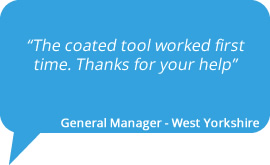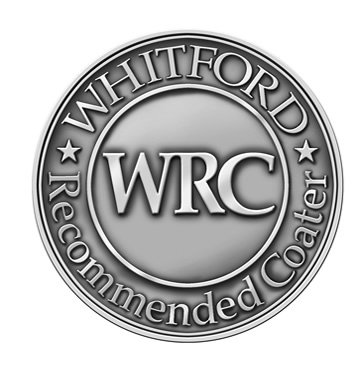
Innovation in medical science has progressed at such a rate, to the point where process requirements have driven traditional engineering materials to a point where additional properties are required and the benefits of Xylan and DuPont coatings can make a significant difference.

Non-stick coatings provide excellent release properties for moulding and forming processes and in some applications, where a process or substance is not permitted to be in contact with a metal substrate, fluoropolymer coatings will act as a physical barrier between the process and the substrate or to stop any permeation and chemical attack.
Pharmaceutical applications include barrier coatings for harsh substances used in processing environments, non-stick coatings for pre-heat plates in capsule packaging and low friction coatings for sliding and mating machinery parts used in manufacturing machinery. Non stick coatings are also used for heat sealing applications for items such as colostomy bags.
Mixing vessels and mixer shafts for liquids and powders also benefit from non-stick coatings, potentially giving a significant saving in clean down time and lost product.
Food processing equipment such as sweet moulds, baking tins, cutting and slicing blades benefit greatly from non-stick coatings. Also, hoppers and augers work with much greater efficiency.

As with all applications, it is important to fully understand the type of food processing that is taking place as certain types of fluoropolymer provide more favourable results with different types of process.
Not all coatings are suitable for food contact uses but those that are, can normally be supported by a Regulatory Compliance Statement that certifies that the composition of the coating complies with FDA or other regional regulations, depending on where the end use operation is taking place.
The packaging industry is under extreme pressure to maintain a continuous, efficient process with minimal stoppages or delays.

Our services to the packaging industry fall into two basic areas. The first relates to low friction coatings for packaging machinery where sliding parts benefit from dry lubrication, in such items as feed gates and hoppers metallic sliding mechanisms and guides. There are a range of options available including PTFE rich systems, or when high abrasive forces are present, we can provide systems that have a higher resin content or even with ceramic or metallic fillers that can provide up to five times more abrasion resistance than a standard coating with only a 20% reduction in the coefficient of friction.
The second area that we serve in this industry is heat sealing, pre-heat and forming equipment. This is an area where the selection of the correct type of coating is critical. The benefits of applying a coating to heat sealing equipment can be enormous in terms of process speed, quality of the seal, both functionally and visually and the potential loss of revenue as a result of process stoppages and down-time. It is important to understand as much about your process as we can including sealing temperatures, type of media, speed etc. This will enable us to select the most appropriate coating system for your application.
Glue build up can be a major problem in packaging applications and non-stick coatings can make a huge difference to the efficiency of the process. Clean down time is dramatically reduced as is the likelihood of causing damage to the dispensing equipment by using aggressive mechanical methods of removing set glue.
Most people don’t pay much attention to the seal on a packet of cold meat or on the bottom of a toothpaste tube but these are the result of vast engineering expertise and resources. These types of product are packaged in almost incomprehensible quantities and at very impressive speed. We fully understand the nature of this industry and we have many solutions for a wide range of problems.
Fluoropolymer coatings offer superb protection against the harshest of substances and very few can affect the strong carbon-fluorine bonds that give these coatings such unique properties. Where harsh substances are processed, it is quite common for designers to specify extremely expensive alloys such as Hastelloy, whereas in many cases it is perfectly acceptable to use 316 stainless steel or similar and with the addition of either a PTFE, PFA or FEP coating, the service life of the part will be substantially increased at a fraction of the cost. We have a range of options available including high-build topcoats and filled mid-coats which act as a physical barrier by increasing the diffusion path of the corrosive process.
Modern chemical processes are highly complex and mostly involve a range of substances at different concentrations. Temperature and pressure are also key factors to consider when selecting a suitable coating system.
We have huge resources of information relating to the effect of almost all substances on fluoropolymer coatings and other plastic materials. With this knowledge, we are able to select the correct type of coating that is most suitable for your application.
Aerospace applications can include low friction and anti-galling systems for moving and sliding parts. Very high speed bearing surfaces can be coated as a failsafe mechanism to act as an emergency, secondary lubricant in the case of failure or in cases of pick-up on static surfaces on air bearings.
In such an industry, components must operate correctly, every time, even if they have not been used for an extended period. The effects of vibration and potential release of electrical currents can be substantially reduced or eliminated with the application of a low friction coating that also has high dielectric strength.
This industry faces huge challenges with salt water corrosion and chemical attack. Fluoropolymer coatings, particularly from the Xylan range, play a vital role on a global scale, protecting key components in one of the harshest natural environments.

Whether the application is corrosion resistance, chemical attack, galvanic corrosion, reducing make-up torque, anti-galling or colour coding of sub-sea connectors, we have a wide range of solutions giving unrivalled performance and allow the use of less exotic metals which has a major cost benefit.
Additional primers and pre-treatments can also be used to inhibit corrosion by promoting the formation of a passive oxide layer on the surface of the metal. Sacrificial protection can also be achieved by adding anodic metallic pigments which corrode more readily than the substrate material. The resulting by product of this will fill pores or pin-holes in the coating which will retard the corrosion process. Inert fillers can be added which create an indirect and increased length of the diffusion path and by providing a barrier to moisture and oxygen the corrosive reaction is reduced substantially.
Many problems encountered within the automotive industry including corrosion, noise, dry lubrication, abrasion, low friction, weathering, sealing and decoration can be solved by the application of a fluoropolymer coating. We can achieve very fine tolerances with the thickness of our cured films and we have state of the art measuring instruments to ensure consistent results.
Manufacturing equipment such as moulds can benefit greatly from a release coating. Many companies continue to spend large sums of money on release agents which are less effective and in most cases, considerably more expensive than the cost of a permanent coating.
Manufacturing machinery parts can also benefit greatly from coating with lower friction and less wear, saving on down time and replacement costs.
PTFE remains stable between a wide range of temperatures, from as low as almost -270⁰c to +260⁰c. Its stability and retention of physical properties at extremely low temperatures make it an ideal solution for cryogenic applications.
A range of coatings are available from almost pure topcoats to resinous single layer systems that can also function without loss of physical properties at temperatures as low as -195⁰c.
There are very few solid substances that can adhere permanently to a fluoropolymer coating. Some tacky materials may adhere slightly but almost all substances release effortlessly.
There are many industrial applications where efficient release is critical to the efficiency of the process, to include thermoforming, rubber and elastomer moulding, adhesive applications and particularly where epoxy resins and similar substances are moulded and formed. Carbon fibre moulds also benefit from non stick coatings.
Release agents are commonly used but these are very expensive, time consuming to apply and far less effective than a durable, hard wearing fluoropolymer coating. Release agents can also affect the visual and physical properties of the moulded product as residues often remain and in most circumstances will have to be removed manually or by an additional, mechanical process.
De-moulding operations can be significantly improved in terms of time and by maintaining product integrity by minimising de-moulding forces and any physical human intervention to remove parts from mould tools.
The benefits of fluoropolymer coatings within the engineering industry are substantial. Processes can be made to run more efficiently with higher machine speeds due to lower friction which in turn, reduces power consumption.
Processing equipment coated with a non stick coating can benefit from a significant reduction in build up of process materials or dust, therefore saving money in wasted product and reducing clean down time.
